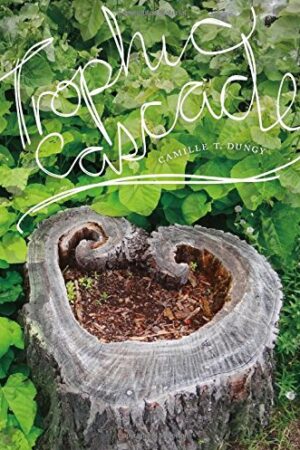Trophic Cascade
by Camille T. Dungy
reviewed by Julie Swarstad Johnson
Nature, motherhood, and racial violence intersect in Trophic Cascade, Camille T. Dungy’s fourth poetry collection. Dungy, editor of the anthology Black Nature: Four Centuries of African American Nature Poetry, demonstrates her mastery of synthesis: fact, observation, and revelation mingle in perfect proportions. Whether she writes about threatened invertebrates, the effects of climate change on penguins, or a family member’s final hours, Dungy’s commitment to accuracy never falters. Nor does her compassion fail. “Grief will ride in on the smallest of bodies, / a tick on a cormorant’s wing,” Dungy writes (“Notes on what is always with us”); with Trophic Cascade, Dungy signals her commitment to the small, the grieving, and the interconnectedness of our world.
Precise details taken from nature and history facilitate imaginative leaps throughout the collection. Consider “After Birth”:
Common as suburban deer, the new mothers see human faces,
human faces, human faces, all these windows,
every garden trampled, every feeder
emptied to spite hunger not as lovely as a birds’,and winter coming on.
Striking and unsentimental, the simile reveals new mothers’ anxieties and society’s casual dismissal of them. Dungy eschews sentimentality but doesn’t discount a mother’s love. “How the sailors’ tongues, / landing on its bitter brilliance, must have cursed / the curse of joy,” she writes, likening a sailor’s reliance on dried limes to the speaker’s joy “that morning the burst / of water brought my sweet girl into our lives” (“Frequently Asked Questions: #9”). Dungy’s surprising comparisons make visible the complicated emotions a mother’s love contains.
Dungy pays tremendous attention to the interplay of sentence and line, and she uses repetition as a tool to reinforce meaning. In “Ultrasound,” every full sentence begins, “I will wait,” the phrase changing position within the line:
I will wait as the tide pool waits. I will
wait as the upturned leaf before dawn.
The hangar for its zeppelin. The student
for her marks. I will wait. I will wait,
untying lace, for the double binding.
Eighteen lines in, the mother’s waiting momentously gives way to a “you,” whose “infant tongue will wait, / unacquainted, for the first taste of cherry.” Elsewhere, varying lengths of line, indentation, and the resultant white space amplify meaning:
A whale fall can support life for over seven decades.
The grotesque
and beautiful bloomingoff a mortal behemoth.
(“Glacial Erratics”)
Dungy shifts our view from death to the gifts it engenders, her drifting lines underscoring the shifting distance between the grotesque and the beautiful.
On racial violence, Dungy turns to direct statements. In “Frequently Asked Questions: #7,” a black flight attendant bursts into tears upon seeing the black speaker calming her child at the back of the plane, images of “All those women sold away // from their babies” coming vividly alive. “Perhaps I could fabricate an image to represent this // agony,” Dungy writes, “but the steward has walked into the galley / of history. There is nothing figurative about us.” “Brevity” follows immediately after, quoted here in its entirety:
As in four girls; Sunday
dresses: bone, ash, bone, ash, bone, ash, bone.
The page gapes, blank, after this image. At the bottom of the next page, also blank, a footnote identifies the four girls: “Addie Mae Collins – Cynthia Wesley – Carole Robertson – Denise McNair,” the young girls brutally murdered in the 16th Street Baptist Church Bombing in 1963. Dungy confronts us with the raw wounds and present threat of racial violence in the US.
Trophic Cascade frequently bears witness—to violence, to loss, to environmental degradation—but for Dungy, witnessing entails hope. The title poem exemplifies this as it describes the reintroduction of gray wolves at Yellowstone National Park. Reintroduced wolves culled the overabundant deer population, and the positive results rippled out to other species, which Dungy catalogues in a rapturous listing of returning “weasel and water shrew,” “hawk shadow, falcon shadow,” “water striders,” and “the night song of the fathers / of tadpoles.” A sudden turn as the poem ends brings everything into focus:
Don’t
you tell me this is not the same as my story. All this
life born from one hungry animal, this whole,
new landscape, the course of the river changed,
I know this. I reintroduced myself to myself, this time
a mother. After which, nothing was ever the same.
Neither reality—the resurgence of plants and animals at Yellowstone or the speaker’s experience of becoming a mother—are diminished by this comparison. Here, and throughout Trophic Cascade, Dungy reminds us of our place, indelibly connected to the world around us. Her poems shake us awake to the rippling effects of the choices we make each day.
Published on August 8, 2017

